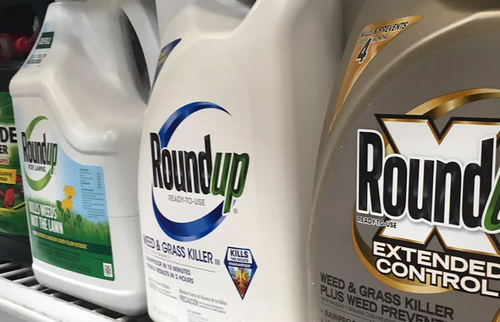
Bayer’s Push For State-Level Roundup Immunity Sparks Backlash In The Heartland
In a brazen bid to shield itself from a tsunami of lawsuits over its toxic Roundup herbicide, Monsanto (acquired by Bayer Pharmaceutical) has unleashed a multi-state lobbying blitz to secure immunity from liability, with Missouri as a key battleground.
The agrochemical giant, reeling from over $8.68 billion in pre-reduction jury verdicts and $11 billion in settlements, is pushing state legislatures to pass bills that would block „failure-to-warn” claims tied to glyphosate, Roundup’s cancer-linked ingredient.
But their heavy-handed tactics have sparked fierce resistance, exposing the corporate underbelly of a company desperate to dodge accountability.
In Missouri, home to Bayer’s North American Crop Science headquarters, the company ramped up its lobbyists from four to nine – or about 1.29 lobbyists for each of the seven Senators of the Missouri Senate Agriculture Committee – directly before introducing Senate Bill 14, and its companion House Bill 2763.
Both bills – nearly identical to those seen in each state where courts have awarded billions for harms – were aimed at shielding Monsanto-Bayer from lawsuits claiming Roundup causes non-Hodgkin’s lymphoma.

Missouri trial lawyer Matt Clement has successfully represented clients in their claims that Roundup was the cause of non-Hodgkin’s lymphoma.
„Monsanto is trying to push legislation that would take away constitutional rights,” Clement told ZeroHedge. „It [Bayer] has not been successful in getting courts to buy its preemption argument, so it is resorting to trying to pass state legislation that will do what most courts have refused to do.”
Missouri courts have already hammered Bayer with massive verdicts: $611 million, upheld on appeals in 2025 for three plaintiffs in Cole County (originally $1.56 billion), and $1.25 million for John Durnell in St. Louis.
With 40,000 cases still pending in Missouri alone, Bayer’s panic seemed palpable. Their strategy? Convince lawmakers that EPA-approved labels, which omit cancer warnings – despite jurys awarding plaintiffs a whopping total of $19.68 billion in verdicts and settlements to-date – should preempt state litigation.
„State law claims, which Monsanto is trying to take away with the proposed legislation, are the only way for private citizens to hold companies accountable,” Clement explains.
In 1947, Congress created The Federal Insecticide, Fungicide, and Rodenticide Act (FIFRA). Last significantly amended in 1972, FIFRA – administered by the Environmental Protection Agency (EPA) – requires pesticides to be registered with the EPA before they can be sold or distributed in the United States.
The law aims to ensure that pesticides are safe for human health and the environment when used according to their labeling.
However, when FIFRA was last reviewed by the EPA, the alleged harms of Roundup (backed by $19.68 billion in settlements) were not yet known. In addition, courts have held that private citizens can’t use FIFRA to sue pesticide manufacturers for damages if they are injured by a chemical.
„In other words,” Clement tells ZeroHedge, „only the EPA can enforce the terms of that law. Because the EPA only reviews the chemicals every fifteen years, there is no real enforcement mechanism except state law. If the proposed legislation takes that away, there is nothing left for an injured person to do.”
Due to the fact that registration and warning labels are administrative law, the only way to hold a company like Monsanto-Bayer accountable for not properly warning consumers, is through state-based constitutional law. Rather than pay out billions in on-going settlements, Bayer shifted its focus to PR and lobbying state lawmakers.
Bayer’s campaign, funneled through the Modern Ag Alliance and „murky groups” like the Protecting America Initiative, has spent an estimated $150,000 to $700,000 across 12 states, including Missouri, Iowa, and Georgia.
In Missouri, nine Freedom Caucus Senators were targeted—Nick Schroer, Brad Hudson, Rick Brattin, Ben Brown, David Gregory, Mike Moon, Joe Nicola, Adam Schnelting, and Jill Carter—with vicious direct-mail flyers.
The mail flyers accused the Freedom Caucus members of betraying American farmers and aiding China by opposing the bill. The senators, incensed by what they called „dark money” attacks, vowed to investigate via the Missouri Ethics Commission, effectively killing HB 2763 in the Senate through a filibuster.
The missteps were catastrophic.
Bayer underestimated bipartisan fury, with 24 House Republicans and 48 Democrats rejecting the bill.
Bayer is essentially bribing both Republican and Democrat congresspeople to insert an extraordinary provision into the Farm Bill that would give the German company immunity from lawsuits over its pesticides, especially Roundup. If these products are as safe as the pesticide… https://t.co/29BJr1vKAv
— Robert F. Kennedy Jr (@RobertKennedyJr) September 13, 2024
Aggressive ads and sponsorship of Governor Mike Kehoe’s inauguration reeked of corporate overreach, alienating allies and fueling perceptions of prioritizing profits over public health. Critics also pointed to Monsanto’s history of manipulating science, as exposed in California courts, which found the company focused on PR over safety.
Nationwide, Bayer’s playbook proved more successful as Georgia passed an immunity bill (SB 144) into law this year. The new law could impact a $2.1 billion jury verdict awarded to plaintiff John Barnes, as Bayer is expected to appeal the case.
North Dakota and Montana also passed shields, but legislative efforts faced resistance in states like Iowa, Florida, Tennessee and Idaho. With 54,000–67,000 lawsuits still looming and a $16 billion litigation war chest, Bayer’s now scrambling for help from the U.S. Supreme Court and lobbying hard for Farm Bill amendments that reinforce federal preemption.
However, Congress could just as easily amend FIFRA to explicitly preserve states’ rights or strengthen EPA labeling oversight. Meanwhile, the Trump administration can also update EPA regulations or issue executive guidance to limit the scope of federal preemption.
These steps would close the loophole Bayer is attempting to exploit at the state level, ensuring victims of Roundup’s alleged harms, can seek justice without federal interference.
Either way, the fight highlights the need for regulatory reforms as the outcome will shape pesticide regulation for years to come.
Bayer’s attempt to rewrite the rules and escape accountability has only hardened resolve among farmers, health advocates, and legislators alike. But, just as this saga illustrates the „corporate capture” outlined in the MAHA Report, the fight over Roundup’s label is far from over.
Tyler Durden
Thu, 06/05/2025 – 22:10

 5 miesięcy temu
5 miesięcy temu











